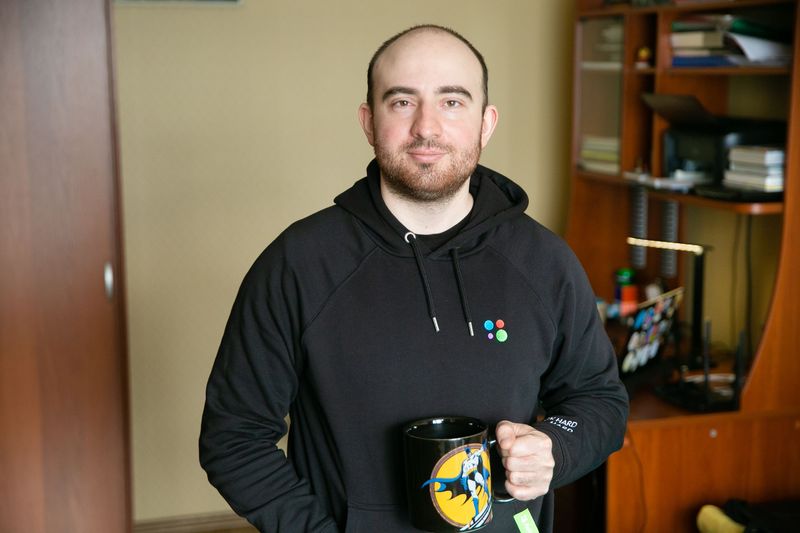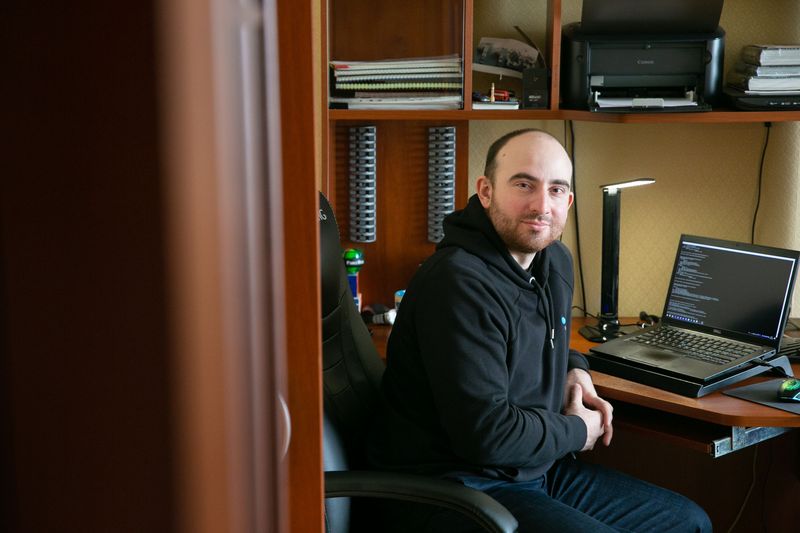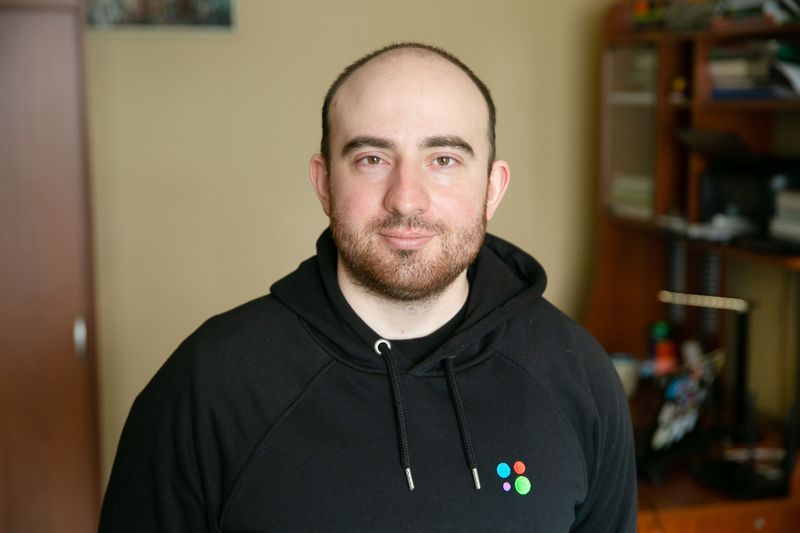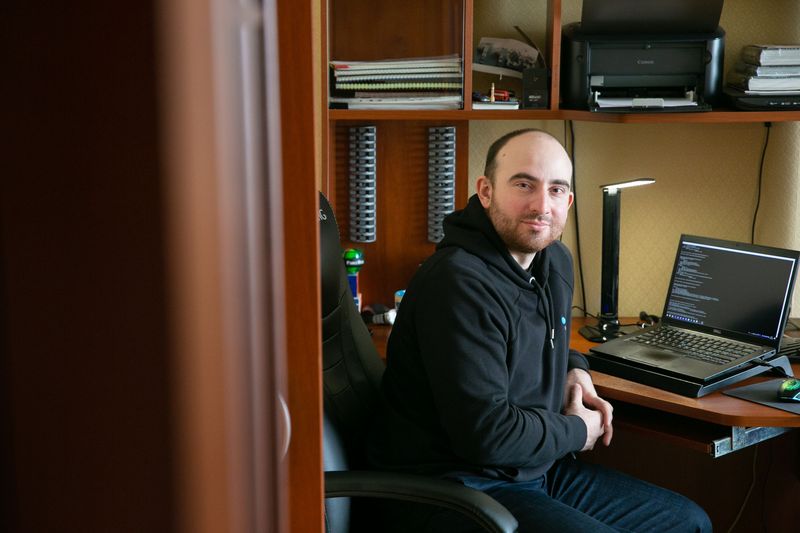“HSE Forged For Me a New Space of Freedom”

As it gets increasingly difficult to succeed in today’s job market with qualifications solely in one field, more and more HSE grads are tapping into the tech industry. Timur Zekokh, who did his bachelor’s at HSE Faculty of Economic Sciences and his master’s at HSE ICEF, has fulfilled himself in the IT field as a senior data analyst at Avito. Here’s how Timur started teaching out of love for econometrics, what essential knowledge is required to start working with data, and what made Avito switch from Excel to Vertica.
Why did you choose to major in Finance and enroll in HSE?
In my home town, Maikop, HSE is a name people haven’t heard much about. I first learned about it from my parents, when they started looking for a good school for me. I checked HSE’s website, student testimonials, alumni stories, found my best-fit degrees and finally chose to HSE Faculty of Economic Sciences (FES). There were actually two schools I was choosing between – HSE and Financial University. The latter, however, seemed to have an admission scheme that offered very little guarantee, whereas HSE was enrolling its first ‘green wave’ class and the curriculum at FES seemed to be such a very good fit.
You moved far away from home. Did you adjust to your new environment quickly?
Very quickly. It was easy to adjust to HSE because my childhood environment was in many respects similar – it expected you to do well, it set the bar high for you, it was a community of like-minded people. It’s just that HSE, compared to my high school, forged for me a new space of freedom, where I could take courses I liked best and learn what I liked most.
Studying was easy, my strong mathematical background was earning me top grades. As a high school student I attended the Republican School of Mathematics and Natural Sciences under the Adyghe State University (ASU) in Maikop – a kind of a prep course for prospective students with strong math skills. My first few weeks in Moscow, of course, overwhelmed me with the fascination of big city and massive amounts of new information. For me, a small-town 18-year-old, it was quite an adventure. I immediately liked this city and started to make friends. We were a close-knit group of students, and because many came from other parts of Russia, just like me, we shared this feeling of being new to the place and we all felt quite okay. In addition, I started to attend the events organized by the Adyghes Foundation in Moscow, so I’ve stayed connected with my culture.
Your first job was with Big Four. What role seemed most attractive to you in the consulting field?
I can’t say I was attracted to consulting, but the Big Four had a strong brand name. It offered just enough experience to kickstart career in a field of interest. My role at PwC involved valuation and financial modeling – it required a profound knowledge of mathematics, exactly my domain. I thought about doing a master’s, but never about going into academia. Business and multinationals felt a more fulfilling choice.
About Timur:
He earned his bachelor’s from HSE Faculty of Computer Sciences in 2016. After completing ICEF’s MSc Financial Economics in 2018, Timur started PhD Financial Markets with Plekhanov Russian University of Economics. His internship with PwC in 2016 was followed by the one at McKinsey Research and Analytics. In 2018, Timur joined the medical company INGAL as senior financial analyst and continued in the same capacity as part of VTB Risk Model Validation unit in 2018–2019. Between 2016 and 2022 Timur taught Quantitative Finance, Econometrics, and Asset Pricing and Financial Markets at HSE.
In 2019, Timur joined Avito, where he started as a data analyst and currently holds the post of senior data analyst and teaches the Econometrics courses at Avito Analytics Academy.
As my experience grew, I enjoyed being a part of corporate environment even more. Multinationals share a certain corporate culture. Once you get to know their internal arrangement and business structure, you’ll find moving from one multinational to another easy. Another important thing is that in multinationals you communicate with people from many different parts of the world. You’ll find your professional horizons expanding in many different directions and within a very short time.
Why did you choose to do you master’s at ICEF?
One reason was that ICEF’s master’s degree has a profound focus on what I wanted to explore most – Financial Mathematics and Econometrics. Even though none of them had any connection to my job roles at the time, it was interesting to do the problem sets – and more so to explore those two fields academically. In addition, ICEF has a highly supportive community of graduates, who can help establish professional contacts, source expertise or find partners for projects.
It was the convenience of the portfolio pathway for entry without examinations that was a decisive factor. I had an impressive portfolio and held a prestigious diploma – they guaranteed me a place on MSc Financial Economics. Besides, its strong focus on math and the well-balanced blend of academic opportunities and applied courses suited me just perfectly.
Was there anything else apart from knowledge of Financial Economics that you expected from your master's study, career-wise, for example?
The causal relationship between career progress and level of education is not always clear. I had to quit my job at PwC when I started my master’s study – thought I wouldn’t be able to combine both. In my second year, I interned with McKinsey’s research department. I generally liked my role there, until the risk management course by Dzhangir Dzhangirov changed everything and made me reconsider my own professional interests.

I joined VTB’s risk validation unit – the decision influenced completely by my master’s study. Unlike many of my classmates who made use of ICEF’s wide array of electives to complement their purely technical background, I benefitted from by master’s study by deepening my knowledge of what I liked to explore most as a bachelor’s student. Even though my previous work experience kept me ahead of what I was being taught, so to say, there were still benefits to gain from learning and, most importantly, pleasure.
Next, I enrolled in PhD programme Financial Markets with Plekhanov Russian University of Economics. I did it mostly out of inertia. I made learning a habit. But since I changed job and my workload increased – I am a part of multiple projects including teaching ones – I decided to take an academic leave and am still on it.
How did your move to the banking sector change your professional interests? What was your role there?
My role as part of VTB’s risk management team dealt with financial risk modeling. There are credit risk models and market risk models. I was more into the market risk models – they repeated the volatility models I studied as an undergraduate and graduate student almost 100%. Hence, I was of help when it came to market risk modeling, and I myself started to see where academic skills correlated with reality and which of the models came useful in the first place.
My banking experience gave me the understanding of what knowledge people in my field need to have in the first place
Alongside this, I could see how communication worked among departments within a bank. We would often help other units with model validation, giving comments and discussing. It felt nice to know my opinion was being trusted – a valuable experience for me. With the Russian companies, the negotiation and approval process is unlike what I got used to while working in multinationals. It is much more complex, banks seem to be overly regulated. There are lots of legal nuances to observe, reports to make, etc. There’s definitely room for simplification and automation – these are a matter of time, as well as digital solutions and new approaches to management.
What led you to start teaching? It was hard to say good-bye to HSE, I guess?
I started out as an English Teaching Assistant at FES, and it was in my second year of master’s study at ICEF that I assumed the role of a real teacher – I taught Econometrics and conducted seminars. In addition, I started teaching my all-time favourite Financial Econometrics to senior undergraduates and Asset Validation to third-years. At that time Corporate Finance was a two-part course, and one involved me to check students’ homework and help with preparing for exams. I really liked teaching. I get along with students quite well, and it gave me pleasure to be sharing the knowledge that I myself sought to expand.

After completing my master's degree, I was invited to teach Quantitative Finance, a new course at the time. I accepted the offer and thus ended up with four course seminars to teach. It was a pleasant challenge, but very high workload. Combining teaching with job began to be difficult. Teaching took all my Saturdays and one weekday, and it was my first year at Avito. I struggled through the year and ended up with two courses only – master’s level Econometrics and Financial Econometrics.
Why did you decide to resign from your banking job and move to the digital sector?
Finance was only a half of what I was interested in learning while at HSE. I developed a passion for machine learning and everything related with it. Machine learning was coming into fashion and was pursued mostly by the IT geeks, so I started learning outside the classroom – data analysis, machine learning, neural networks – by myself and by doing courses, some at HSE. I noticed a connection between digital science, econometrics, financial econometrics and statistics. The latter three helped me to build strong tech skills.
I started looking for a job where I’d be able to combine both fields, and this is how I joined Avito, namely its data analytics department. It happened not without the help from ICEF and its highly supportive graduate community. I met some guys who worked at Avito, they spoke high of its corporate culture and attitude to human capital and employee growth. What they told about their job responsibilities sounded interesting: Avito seemed to offer good prospects for fast growth. They also mentioned that Avito was hiring for the position of a data analyst, and I thought why not give it try. I sent my resume, passed all selection stages, met with the team. I liked them and the they liked me, I got hired and we’re still a team.
A move as cardinal as this, did it go smoothly for you?
It was a cardinal move, indeed, but it went smoothly. I even liked the experience, it was captivating. It made me stop coasting along doing my job as usual. What I did in finance was one type of tasks always followed by presenting outcomes. At Avito, the approach is completely different in terms of communication and trust in employees. It took some time to become accustomed – not to my new line of tasks, but to the entirely new format of the inner workings. It suited me well, so getting used to my new role was easy. As to finance, I didn’t lose touch with it because I continued to teach at HSE. I didn’t want to burn my bridges.
What is it that makes Avito's corporate culture special?
First, transparency of growth. At Avito, you know precisely what you are expected to achieve as a data analyst in order to climb up the ladder. Doing well on one point guaranteedly moves you up the scale on another. The second thing that came as a pleasant surprise was the advanced software that supports many programming languages, databases, deep analytics tools, etc. To put this in perspective, many companies are still using Excel as their main tool for data storing, processing and outputting.
Avito functions by using approximately the same technologies as are in use by international IT giants such as Google and Amazon
We use Vertica as the main analytic database and Python as our main programming language, as do nearly all international companies. Reporting was previously done in Tableau, one of the most commonly used IT tools, and is now in Redash. All this puts Avito far ahead of the competition on the Russian market in terms of data management services. It offers the workplace which is in many ways as comfortable as in the world’s top IT companies.
You are teaching at Avito Analytics Academy. Can you tell more about it and your role in it?
At the time when I joined Avito, its analytics department was headed by Dina Simkina, and it was she who came up with the idea of Avito Analytics Academy.

The idea was to start a school where learners would receive the skills required for data analyst jobs and then join Avito as fully trained employees. The management found Dina’s idea viable, and Avito Analytics Academy was given a go. It offers two programmes, one in data analysis and the other in data science. I joined it as Econometrics course teacher at Dina’s request. She remembered from my job interview that I had taught before and said she would appreciate it if I could contribute. So, this is basically how I became the Academy’s resident lecturer since its very start. I and my colleagues have designed an Econometrics course with concentration in IT, and since 2023 I am also a coordinator for the Academy’s data analysis programme. My previous teaching experience came in very useful. I am supervising all the teachers in this project and provide guidance for all its courses – a new exciting role for me in the IT sector.